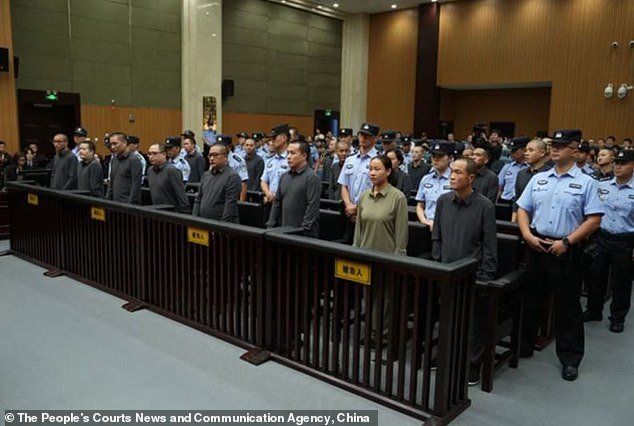Eleven members of a notorious organised crime family have been sentenced to death in China for running international online scams worth £1billion.
The Wenzhou Intermediate People’s Court sentenced Ming Guoping, Ming Zhenzhen, Zhou Weichang – all members of a powerful family in Kokkang, Myanmar – to death along with eight others, according to a court statement.
On Monday, the court also handed death sentences suspended for two years to five others, while a further 12 defendants received jail sentences of between five and 24 years. Two-year suspended death sentences are often converted to life in prison.
Other punishments included various fines, confiscation of property and deportation, a Chinese court heard.
According to China Central Television (CCTV), the Ming family criminal syndicate had exploited their influence in the Kokang region of Myanmar.
Operating since 2015, the family worked for one of the four clans who ran the Laukkai district, close to China’s border.
The area was quickly turned into a hotspot for gambling, drugs, and scam centres.
The sentences came shortly after China on Sunday separately sentenced former Minister of Agriculture and Rural Affairs Tang Renjian to death with reprieve for taking bribes.

A court in China has sentenced 11 people to death for their roles in a billion-dollar family-run criminal empire built on online scam and gambling operations in a remote border region of Myanmar, and for the deaths of workers who tried to escape
Tang took bribes of more than £28million in cash and property between 2007 and 2024, according to a statement by the Intermediate People’s Court of Changchun in the northeastern Jilin province.
China issued arrest warrants for members of the Ming family in November 2023 on suspicion of fraud, murder and illegal detention as part of a crackdown on illegal scam operations near the border with Myanmar.
What started out as casinos evolved into fronts for money laundering, trafficking and dozens of scam centres.
Working with financiers, the family syndicate carried out telecom fraud, illegal casinos, drug trafficking and prostitution, implicating more than £1billion in illicit funds.
Estimates suggest that illegal casinos were generating several billion pounds in profit every year.
The syndicate’s crimes resulted in the deaths of 10 workers and injuries to two others who tried to escape the scam centers it ran, the court statement said.
The centers, in which criminals run sophisticated online scams targeting people all over the world, have proliferated in countries in Southeast Asia, including Myanmar, Laos and Cambodia.
They often use trafficked workers who are forced to conduct romance-based investment scams as part of a globalised industry that the United Nations Office on Drugs and Crime estimates is worth £30billion annually.
The root location for what the UN later called the ‘scamdemic’, the centres saw more than 100,000 foreign nationals – including many Chinese people – being lured in and effectively imprisoned.
Captured people were forced to work long hours, running sophisticated online fraud operations targeting victims from all over the globe.
Once the most powerful family in Myanmar’s Shan State, the Ming family ran scam centres, some holding more than 10,000 workers.

Eleven members and associates of the Ming crime family were sentenced to death on Monday by the Wenzhou Intermediate People’s Court in eastern China’s Zhejiang Province, according to a court statement
The most notorious compound was known as Crouching Tiger Villa, where workers were routinely beaten and tortured.
The Ming family reign came to an end two years ago when insurgent groups formed an alliance and attacked the Myanmar military in the region.
The groups took control of the area forcing out local authorities, pulling the rug out from beneath the Ming family operation.
Ming Quechang – the family patriarch – reportedly killed himself and other family members were handed over to the Chinese authorities.
Some have since confessed to their involvement in the criminal activity.
Thousands of those working in scam centres were also handed over to Chinese police.
China is cracking down on scam centers in the region through joint operations or coordinating with local police forces.
In February, China, Myanmar and Thailand exerted pressure on scam centers located along the Thai-Myanmar border, resulting in the release of more than 7,000 workers, most of whom were Chinese citizens.

